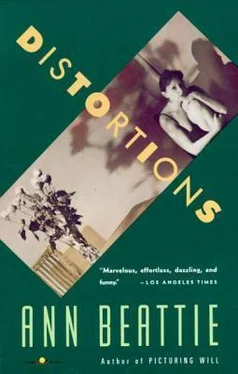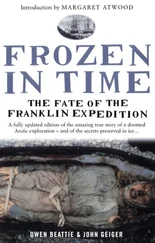Ann Beattie - Distortions
Здесь есть возможность читать онлайн «Ann Beattie - Distortions» весь текст электронной книги совершенно бесплатно (целиком полную версию без сокращений). В некоторых случаях можно слушать аудио, скачать через торрент в формате fb2 и присутствует краткое содержание. Год выпуска: 1991, Издательство: Vintage, Жанр: Современная проза, на английском языке. Описание произведения, (предисловие) а так же отзывы посетителей доступны на портале библиотеки ЛибКат.
- Название:Distortions
- Автор:
- Издательство:Vintage
- Жанр:
- Год:1991
- ISBN:нет данных
- Рейтинг книги:5 / 5. Голосов: 1
-
Избранное:Добавить в избранное
- Отзывы:
-
Ваша оценка:
- 100
- 1
- 2
- 3
- 4
- 5
Distortions: краткое содержание, описание и аннотация
Предлагаем к чтению аннотацию, описание, краткое содержание или предисловие (зависит от того, что написал сам автор книги «Distortions»). Если вы не нашли необходимую информацию о книге — напишите в комментариях, мы постараемся отыскать её.
Distortions — читать онлайн бесплатно полную книгу (весь текст) целиком
Ниже представлен текст книги, разбитый по страницам. Система сохранения места последней прочитанной страницы, позволяет с удобством читать онлайн бесплатно книгу «Distortions», без необходимости каждый раз заново искать на чём Вы остановились. Поставьте закладку, и сможете в любой момент перейти на страницу, на которой закончили чтение.
Интервал:
Закладка:
She drinks tea with him, tired because she didn’t nap.
“I don’t sleep well,” he tells her. “I want to talk all the time. My daughter doesn’t sleep either. In the day we fight, or I worry her, but at night I think she’s glad to have someone to talk to.”
The snowplow is passing the house, slowly, the lights blinking against the newly plowed snowpiles. The lights illuminate a snowman on the next lawn — crudely made, or perhaps it’s just not lit up from the right angle. She remembers her first snowman; her mother broke off the broom handle to give her and helped push the handle through the snowman. Her mother was impetuous, always letting her stay home from school to enjoy the snow, and her father had been surprised when he returned from work to see the broom head on the kitchen table. “Well, we couldn’t get out. How could we go out in the snow to get anything?” her mother had asked her father. The snowplow has passed. Except for the wind, it is very quiet outside. In the room, the man is talking to her. He wants to show her his postcards. She’s surprised; she hadn’t realized she was being spoken to.
“Oh, not that kind of postcard. I’m an old man. Just pretty postcards.”
He has opened a night-table drawer. Inside there is a box of tissues, a comb and brush, an alarm clock. He sits on the side of the bed, his feet not quite touching the floor, reaching into the drawer without looking. He finds what he wants: an envelope. He removes it and carefully pulls out the flap. He lets her look through the postcards. There is a bird’s nest full of cherubs, a picture of a lady elegantly dressed in a high, ruffled collar, curtseying beneath a flowering tree, and one that she looks at longer than the rest: a man in boots and a green jacket, carrying a rifle, is pictured walking down a path through the woods in the moonlight. Stars shine in the sky and illuminate a path in front of him. Tiny silver sparkles still adhere to the postcard. She holds it under the lamp on the night table: the lining of his jacket is silver, the edges of the rocks, a small area of the path. There is a caption: “Joseph Jefferson as Rip Van Winkle.” Beneath the caption is a message, ornately written: “Not yet but soon. Pa.”
“Did your father write the postcard?”
“That’s just one I found in a store long ago. I could make up a romantic story to tell you. I love to talk.”
She waits, expecting the man’s story. He leans back in bed, putting the envelope back in the drawer. His bedroom slippers fall to the floor, and he puts his legs under the covers.
“People get old and they can’t improve things,” he says, “so they lie all the time.”
He waves his hand, dismissing something.
“I trust young people,” he says. “I’d even tell you where my money is: in the dresser drawer, in the back of a poetry book.”
The snowplow has returned, driving up the other side of the street. The lights cast patterns on the wall. He watches the shadows darken the wallpaper.
“I have real stories,” he says, pointing to a photograph album on a table by the chair. “Look through and I can tell you some real stories if you want to know.”
He is ready to sleep. She arranges the quilt at the bottom of the bed and starts to leave.
“The light doesn’t bother me,” he says, waving her toward the chair. “Look through my album. I’m old and cranky. I’m afraid for my pictures to leave the room.”
It’s early afternoon and no one is in the house. There are dishes on the dining-room table, records and record-album covers. There’s a plate, a spoon, two bowls, three coffee cups. How many people have been here? There’s no one to ask. There’s some food on the counter top — things she doesn’t remember buying. An apple pie. She goes into the living room and sits in a chair, looking out the window. More snow is predicted, but now the day is clear and bright, the fields shining in the sun. She goes into the kitchen again to look for the note he hasn’t left. On her way to the bedroom to sleep, she looks out the window and sees David coming up the road, only a sweater and scarf on, holding a stick at his side that the dog is jumping for. On the floor by the chair the plant book is open, and several others, books he’s studying for his exams. The front door is open. The dog runs into the living room, jumps on her.
“You should be asleep. You can’t work at night if you’re not going to sleep in the day.”
“I thought I’d wait for you to come back.”
“You shouldn’t have waited. I could have been anywhere.”
“Where would you go?”
He’s chilled. His knuckles are bright pink, untying the scarf at his throat. He’s putting another log on the fire, pushing the screen back into place.
“How’s the old man?”
“He’s no trouble. Last night I fixed his photograph album for him. Some of the pictures had come loose and I glued them in.”
“You look like you need sleep.”
“Looks like you’ve been working,” she says, pointing to the books by the chair.
“I’ve had trouble concentrating. The snow was so beautiful last night. I took the dog out for long walks in the woods.”
David is stroking the dog, who lies curled by the fire, panting in his sleep.
“Get some rest,” he says, looking at his watch. “I met the people who moved in down the hill and told them I’d help put a sink in. He’s very nice. Katherine and Larry Duane.”
David kisses her on his way out. The dog wakes and wants to go with him, but at the front door he’s told to stay. The dog whines when the door closes, then waits a minute longer before going back to the living room to sleep by the fireplace.
“It’s awful. When you get old you expect things to be the same. Sometimes I think the cold air could clear my head. My neighbor is ten years younger than me and he jogs every day, even through snow.”
“I’m leaving now,” his sister says. She puts on a blue coat and a blue velvet cap that ties under the chin. Her hair is white and copper. She has small, dainty hands. She repeats that she’s leaving and pats him on the shoulder, more to make sure he’s listening than out of affection. “There are oranges in the bag on your bureau. Linus Pauling says that a sufficient intake of vitamin C will prevent colds.”
“How would I get a cold? Every day is the same. I don’t go out.”
Her coat is buttoned, her hat tied securely. “That’s like asking where dust comes from,” she says, and disappears down the stairs.
“She’s very good to come every day. I forget to thank her. I take it for granted. Fifteen years makes so much difference. She’s able to do so much more, but her hands hurt her. She does embroidery so they don’t go stiff.”
He is looking through a book of Currier and Ives prints. “I suppose I’ll have to eat her oranges. There’ll be more from Florida when they get back.”
She looks at a picture he holds up for her to see, offers to read him science-fiction stories.
“I don’t think so. My sister read them this morning. I’ve had enough make-believe. No spaceships are coming to Earth today, only snow.”
She looks at her watch to see if it’s time for his medicine. Her watch isn’t there. Did she forget to wear it? He asks for tea, and while the water is boiling in the kitchen she dials David, to see if the watch is on the night table. She hangs up and dials again, but there’s still no answer. She looks out the window and sees that it has already begun to snow. Perhaps she lost the watch on the way in. The clasp was loose — she should have asked David to fix it. She turns off the burner and goes outside, looking quickly up and down the front walk before the snow begins to accumulate. She doesn’t see it. The car? She looks, but it isn’t there. She looks on the front steps and in the entranceway. No. It must be at home. She reheats the water, making tea, and carries the cup and saucer upstairs.
Читать дальшеИнтервал:
Закладка:
Похожие книги на «Distortions»
Представляем Вашему вниманию похожие книги на «Distortions» списком для выбора. Мы отобрали схожую по названию и смыслу литературу в надежде предоставить читателям больше вариантов отыскать новые, интересные, ещё непрочитанные произведения.
Обсуждение, отзывы о книге «Distortions» и просто собственные мнения читателей. Оставьте ваши комментарии, напишите, что Вы думаете о произведении, его смысле или главных героях. Укажите что конкретно понравилось, а что нет, и почему Вы так считаете.












